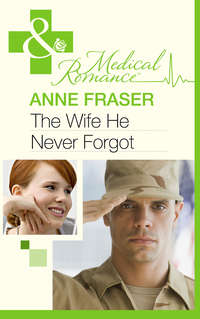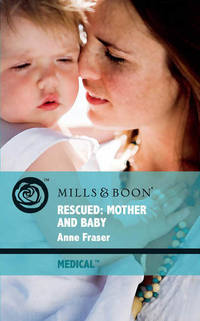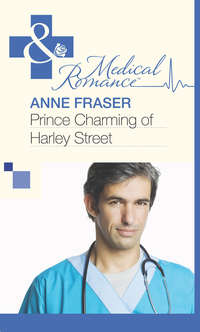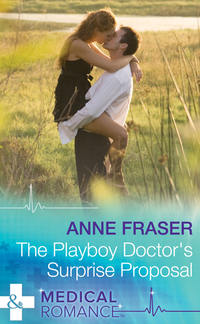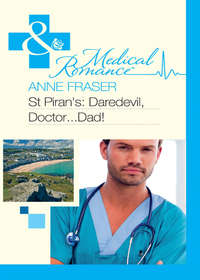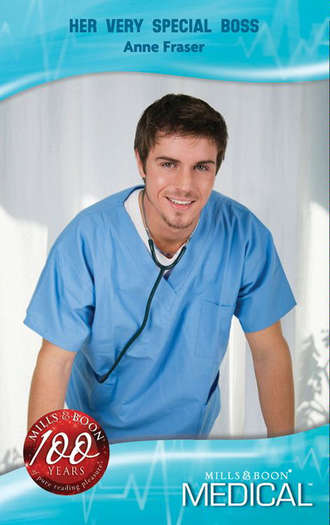
Полная версия
Her Very Special Boss
‘Ah, our new recruit! Come to check we’re taking good care of your patients from last night?’ But there wasn’t an ounce of malice in the question. ‘Here’s Mr Mhlongo. Says we can call him Eddy! And he must be doing fine because he’s already been teasing the nurses. Perhaps we should plaster the other arm, what do you think?’ A nursing sister cheerfully translated the doctor’s words to Eddy.
‘Dumela,’ Kirsty greeted the chuckling man, covered in plaster on one side of his chest all the way down to his fingers with his neck stabilised in a brace. He might not have realised it yet but he owed his life to the seat belt that had prevented him from meeting a similar fate to the driver when the front of the minibus had slammed into the ground. She felt his pulse and although she’d been concerned he might have sustained a serious concussion, his bright eyes told her otherwise. A broken shoulder and a severe case of whiplash seemed to be the worst of his problems. Not so the patient in the bed closest to the nurses’ station or the one in Intensive Care, but the two other patients in the ward she’d attended to yesterday were doing fine.
Kirsty was surprised at the number of patients in the hospital cared for by a very small complement of staff. In fact, some wards were so crowded that some patients were sleeping on mattresses on the floor or, as the case in the children’s ward, doubled up in cots.
‘What about the risk of cross-infection?’ she asked Greg.
‘We are as careful as we can be. Most of those sharing are siblings with the same condition.’
‘Surely not those with HIV or AIDS?’
‘Actually, contrary to popular belief, it is these patients who need to be protected from infection and not the other way around. After all, it is their immune systems that are compromised, rendering them vulnerable to every infection and germ around,’ Greg told Kirsty. He turned to the nursing sister who was accompanying them. ‘Isn’t that right, Sister?’
The nursing sister shrugged her shoulders. ‘Too many with the disease. We try to take special care but…’ The shake of her head told much without words. It had been a fact of life for so long that it was difficult, if not impossible, not to become desensitised.
‘Come on, let’s get you fed and then, if you’re still up for it, you can come and help me in Outpatients. Although it’s Sunday, we’ll have a full clinic. Days of the week have no meaning out here. Most of them will have walked for days just to get here and I don’t like to keep them waiting any longer than necessary. I’ve eaten…’ he glanced at his watch ‘…but I’ve time for a quick cup of coffee, so I’ll show you where the staff dining room is then leave you to it. The other staff will probably be there, except for the Campbells who tend to eat breakfast in their own house.’
When they entered the dining room she was pleased to find Jenny there if no one else.
‘Jenny will show you to Outpatients when you’re ready. Take your time,’ Greg said, and after a quick gulp of coffee left the two women to it.
‘Does he ever slow down?’ Kirsty asked, looking at Greg’s retreating back.
‘Not really,’ Jenny acknowledged. ‘The man is a human dynamo. I can’t remember the last time he took a day off. The rest of us are more human: he insists we take a couple of days at least every third week.’ She eyed Kirsty’s thin frame thoughtfully. ‘Don’t worry, no one will expect you to work these hours, dear.’
‘I’ll do my share,’ Kirsty said. ‘I’m stronger than I look.’ She stirred the lumpy porridge thoughtfully. ‘Maybe Greg works too hard,’ she said, choosing her words carefully. ‘Sometimes he seems a little…well, abrupt. Or is it just me? Have I done something wrong?’
‘Oh, don’t mind Greg. His bark is worse than his bite. He’s a real softy really. As you’ll find out.’
‘Softy’ was the last word Kirsty would have used to describe Greg. ‘What happened to him?’ she asked, curious to know more about this man she was to work with over the coming months.
‘You mean his face? The scars? I hardly notice them any more.’ Jenny hesitated for a moment before seeming to make up her mind. ‘Oh, well, you’ll find out sooner rather than later anyway. It’s impossible to keep secrets in a community of this size. He got them trying to rescue his wife and child from their burning house. They were on their own, just before Christmas—five years last Christmas, in fact. He had been called to the hospital—some emergency I expect. He arrived home to find his house in flames and the fire brigade battling to get it under control. His wife and daughter were still inside. Greg tried to get to them even though the firemen had already failed. They couldn’t hold him back. He went in and brought them out. But it was too late. They had both died from smoke inhalation. Apparently the fire started from the Christmas-tree lights. He was devastated. They were his whole world. I don’t think he has ever come to terms with the loss—I’m not sure that one does.’
Kirsty was stricken. Memories of her own tragedy came flooding back. Although fifteen years had passed, there wasn’t a day when she didn’t think of her mother or Pamela.
Jenny shook her head sorrowfully, unaware of Kirsty’s reaction. ‘I think Greg blames himself, God knows why. There wasn’t anything anybody could have done. The poor man was in hospital himself for weeks. Once he was discharged he left Cape Town. I expect he couldn’t bear to stay anywhere near the place where they had been so happy. He came here and has been here ever since. He works so hard. It’s as if he is trying to exorcise his demons through sheer hard work. He never talks about it or them, and if I were you, I wouldn’t ever raise the topic. I tried once and got my head bitten off.’
‘How awful.’ Kirsty blinked away the tears that threatened to surface. No wonder he was brusque. Now she knew, she would have to be more sympathetic.
‘He still wears his wedding ring,’ she said.
‘You noticed, then?’ Jenny cast a mischievous look at Kirsty. ‘I wouldn’t get any ideas in that direction. There has been many a young doctor and nurse who has tried to offer Greg comfort, but while he doesn’t seem adverse to the odd casual fling, I doubt somehow that he’ll ever let anyone really get under the barrier of ice he seems to have wrapped around his heart.’
Kirsty felt her cheeks flame at the implication. ‘I can assure you,’ she said stiffly, ‘a relationship with anyone is the last thing on my mind.’
Subconsciously she fingered her now bare ring finger. ‘I’ve had enough of men to last me a lifetime.’ She ignored Jenny’s curious look. ‘I’m here to work and to learn. Nothing more.’ She drained her coffee. ‘Sorry.’ Kirsty grimaced, suddenly aghast at the turn the conversation had taken. The kindly doctor in front of her must think her rude. ‘I’m not usually so prickly, it’s just…new place, new people, new challenges. It’ll take me a day or two to settle in, I guess.’
By the time Jenny left Kirsty outside the outpatient clinic, with a hasty apology that she had another Theatre list due to start, there were several patients sitting outside, waiting their turn to be seen. Most of the women still wore traditional dress and despite the intense heat had their children strapped onto their backs with thick blankets. For the most part the children seemed quiet—subdued even. One little boy squatted in the dust, lazily poking at the ground with a stick. When he looked up Kirsty could see that one of his eyes was sticky with what looked like a chronic infection. She tilted his chin—he needed something for his eyes, the sooner the better. She glanced around and spotted a nurse moving between the patients, taking histories and writing notes. Kirsty guessed she was probably assessing who needed to be seen first. Just before Kirsty could grab her attention she noticed a young woman clutching a bundle to her breast. There was something in the woman’s posture—an air of despair—that made Kirsty catch her breath. She moved closer, and gently lowered the blanket to reveal a small, painfully thin child who was making no effort to take the proffered breast of the young mother. The child’s face was so thin it seemed almost skeletal, the skin clinging to the fragile bones of the skull. Flies settled and buzzed around the tiny mouth and closed eyes. For a heart-stopping moment Kirsty thought the child was already dead. She felt for a pulse and was rewarded with a faint flutter beneath her fingertips. The child was still alive, but surely not for long. With one swift movement she lifted the infant up, its tiny frame feeling no heavier than a feather, and rushed into the department. This child couldn’t wait. It needed fluids in the form of a drip straight away or he or she would die.
Ignoring the wails of the young mother, she searched frantically for Greg. She found him crouching in front of an old woman, examining a suppurating sore on her foot.
Greg took one look at Kirsty’s anguished expression and stood up.
‘What is it?’ he asked, bending forward to look at her small bundle. ‘Not another case of marasmus—starvation,’ he said despairingly. ‘OK, bring her into the treatment room and let’s see what we can do. If there is anything we can do.’
Within moments the small child, a girl, was lying on the couch, her mother sitting close by, her eyes flitting from Kirsty to Greg. One of the nurses had joined them and was talking to the mother in rapid Sotho.
‘The child stopped taking the breast two days ago. She’s been sick for over a week. A traditional healer gave her mother some herbs to give her, but when they didn’t help and she stopped taking the breast, the mother decided to bring her to us. It’s taken two days for her to get here.’
While the nurse repeated the history, Greg and Kirsty had been searching for a vein in which to insert a drip. Kirsty knew that they had to get the small child rehydrated as soon as possible.
‘I can’t find any in her arms. They all seem to have collapsed,’ Kirsty told Greg, fear catching her voice. They had no time. The child could die if they didn’t treat her right away.
Greg looked up at her. ‘Slow down. We’ll find one. Look here just above the foot. We’ll need to do a cut down. It’s not ideal, but it’s all we have. Have you done one before?’
‘I have, but I’d rather watch you first, if that’s OK,’ Kirsty said. This child was so small, so desperately ill. What if she was too slow?
‘You’ll have to do it, I’m afraid. You may have noticed my right hand only has restricted movement. It’s fine except for the most delicate stuff.’ Kirsty could only guess what it cost Greg to admit his limitations. At the same time she admired him for it. She had once seen a doctor attempt to perform procedures above his capabilities and the results had almost been disastrous.
Greg noticed Kirsty’s hesitation. ‘You’ll be fine. I’ll talk you through it.’
Somehow his belief in her gave her confidence and with very little assistance from Greg she performed the procedure perfectly and without any wasted time.
‘Excellent job.’ Greg’s praise was fulsome and genuine and Kirsty felt elated. She thought that she might grow to like her job here.
‘OK, let’s get her started on the usual regime.’ He directed a few rapid words towards the mother.
‘She’s three years old,’ he translated for Kirsty.
Once again Kirsty was horrified. Three! It wasn’t possible. The child looked no older than nine months, a year at the most. She was so tiny.
‘Obviously we can’t use her age to work out how much we need to give her. By my guess she weighs just over eight kilograms. Could you pop her on the scales?’ he asked the nurse.
The nurse scooped the child up and laid her gently on the scales.
‘Just right—eight kilos,’ she told Greg.
‘Any thoughts on the dosage we should be administering?’ Greg asked Kirsty.
Kirsty thought frantically. She had completed six months in paediatrics as part of her houseman jobs. But the children there had been so much bigger, stronger than this child in front of her. She had never seen anyone in such an advanced stage of starvation before. How could she have? But she remembered a child, physically handicapped, who had been brought in following a severe episode of diarrhoea. The child’s condition had been similar to if not quite as drastic as that of this child in front of her.
She was about to hazard a guess, but Greg hadn’t waited for her response. He adjusted the drip and straightened up. She could sense the fatigue and something else—could it be anger?—behind his professional exterior.
‘We’ve done everything we can for the time being. It’s in the lap of the gods now.’ He tossed his gloves into the bin. ‘The main problem is caused by formula. The government spends substantial sums of money promoting breast-feeding, but the problem is with the women who are HIV positive. The danger of them transmitting the disease to their infants through breast milk is just too large, so they are encouraged to give their babies formula. Unfortunately formula is too expensive for most of them, so they start diluting it to make it go further. Then the children simply don’t get enough calories or nutrition. And as if that isn’t bad enough, a large number of the outlying villages still don’t have access to clean water. So the women mix the powder with water from the river. And what you see before you is the result.’
‘Can’t we do anything about it?’ Kirsty asked. ‘Surely it’s just a matter of education?’
Greg smiled, but there was no humour in his eyes. ‘Education and clean water. That’s what is needed. In the meantime…’ He let the words hang in the air for a moment. ‘In the meantime we do the best we can. Come on, Kirsty, as you’re about to see, there is plenty more for us to do.’
‘But doing the best we can isn’t enough. Is it? Not if children are still dying?’ Surely he wasn’t going to tell her there was nothing they could do to prevent this? He didn’t strike Kirsty as a man who let anything stop him from doing what was right.
‘We’ll talk about it later,’ Greg said quietly but firmly. ‘Right now we have work to do. You take the consulting room next door. I’m just across the hall. If you need me, give me a shout, but try the nurses first. I think you’ll find that there is precious little they can’t help you with.’ And without waiting for a reply, he turned on his heel and left the room.
CHAPTER THREE
THE rest of the morning passed quickly. Kirsty saw many children with the swollen bellies and stick-like limbs of kwashiorkor, a condition the nurses told her was caused by poor nutrition and lack of vitamins. The nursing staff were fantastic. They worked unstintingly throughout the day, pausing to answer Kirsty’s questions with unfailing good humour and patience. Kirsty felt humbled to be part of their team and full of admiration for their level of expertise. The patients too were remarkably stoic and, despite long waits in the overcrowded department, were universally grateful for everything Kirsty did, however small. Occasionally, to her surprise, she could hear laughter filtering through the walls of the consulting room.
Eventually the clinic quietened down, until all that was left was dressings and vaccinations that the nursing staff on the back shift would finish off.
As Kirsty leaned back in her chair, a wave of exhaustion washed over her. But it felt good. She closed her eyes.
‘Lunch?’ Greg popped his head around the door and as if in answer Kirsty’s stomach growled. Now that he mentioned it, she was starving. The cup of coffee and the watery porridge she had eaten at breakfast-time had made her appreciate why the others ate at home. As soon as she had the opportunity she was going to stock up on provisions, but in the meantime…
‘Lead me to it,’ she said, jumping out of her chair. I hope he doesn’t think I’ve spent the morning snoozing, she thought.
‘Come on, then. I gather you did pretty well this morning. The nurse told me you worked throughout without a break. Well done.’
Kirsty felt herself glow with pleasure. Maybe he wasn’t going to be so difficult to work for after all.
‘I am going out to one of the villages tomorrow to do a clinic, if you’d like to come with me,’ Greg said as they made their way to the staff dining room. Kirsty almost had to run to keep up with his long strides. ‘You’ve seen the bad, now I’d like you to see the good.’
‘I’d love to,’ Kirsty said, ‘but I’d like to check up on the child we saw this morning before lunch, if that’s OK. I don’t mind missing lunch if we’re pushed for time.’
Greg’s eyes swept over her figure. He shook his head. ‘You look as if you could do with a good feeding up yourself, so missing lunch isn’t a good idea. You’ve been working hard and a sick or weakened doctor is no good to anyone. Of course we can take the time to pop into Paediatrics before we eat, but if you are going to survive out here, you’ll need to become less emotionally involved. I find too much emotion can cloud a doctor’s judgement.’
So much for thinking he was going to be easy to work for! It hadn’t taken long for his habitual curtness to resurface. And who was he to tell her when she had to eat? And as for telling her not to become too involved, she had heard those words before. She thought it would be different out here. She thought, if anything, doctors came here to work because they wanted to be involved. But clearly not Dr Greg du Toit. The man had no feelings. He was simply a working machine.
‘I think I’m old enough to look after myself,’ Kirsty said frostily. ‘I don’t mind you commenting on my work, but what I eat and what I feel is up to me, don’t you think?’
Her words stopped Greg in his tracks. He turned to look at Kirsty with glittering blue eyes. Suddenly he smiled.
‘OK, OK.’ He put his hands up in mock surrender. ‘You win. However, no missing meals—is that understood?’
‘Yeah, yeah, and no late nights or alcohol or strange men in my room after midnight. Gotcha.’
Greg’s smile grew broader. ‘God, I do sound like a Victorian father, don’t I? Kathleen was always telling me to lighten up.’ His smile disappeared and Kirsty could see the pain in his eyes. For a moment she was tempted to reach out to offer him comfort. She touched his arm gently, feeling the muscles tense beneath her fingertips.
‘Was Kathleen your wife?’ she asked softly.
He drew back from her touch as if she’d caused him physical pain.
‘Ah, I see people have been talking,’ he said, his lips set in a grim line.
‘Jenny told me what happened. I’m so sorry, Greg. I don’t know how anyone can bear such a loss.’
‘Well, let’s hope you never have to find out,’ he said, rubbing his hand across his scars. ‘Some things are just better not thought about.’
That’s where you are wrong, thought Kirsty, feeling the familiar flicker of pain.
‘You must miss them,’ Kirsty ventured. Inexplicably she felt the need to get closer to this man.
‘As you told me just a few minutes ago, everyone has a right to their privacy. I’ve agreed to respect yours and I’d be grateful if you would respect mine.’ Despite his words, his tone was mild. But Kirsty could see by the set of his jaw that he was holding himself in check.
Nevertheless, Kirsty felt as if she’d been slapped.
‘I’m sorry,’ she said stiffly. ‘I didn’t mean to pry.’
Greg rubbed his scar. ‘No, forgive me,’ he said. ‘I didn’t mean to have a go at you. I’ve probably been here too long and have forgotten the social niceties. Let’s just forget it.’
He paused next to a path that led away from the hospital towards the perimeter of the compound. ‘If you follow that path for a few minutes, you’ll come to a large concrete reservoir. We use it for swimming. Jamie makes it his business to keep it clean. We often congregate there after work or at weekends.’ He carried on walking. ‘There are four doctors here, as you know—you make the fifth. We take turns at being on call, and we all operate but Sarah is nominally in charge of obstetrics, Jamie paediatrics, Jenny anaesthetises and has responsibility for the medical wards. The surgical wards are mine. There’s a rota for outpatients as that involves a bit of everything.’
‘What will I be doing?’ Kirsty asked
‘You’ll be learning.’ He looked at her intently. ‘At this point you have no idea how quickly you’ll be learning. A couple of weeks and you’ll be expected to manage on your own, although, of course, we will always be available for advice. I’m afraid, Dr Boucher, we can’t carry people here. It’s a case of see one, do one, teach one.’
Конец ознакомительного фрагмента.
Текст предоставлен ООО «ЛитРес».
Прочитайте эту книгу целиком, купив полную легальную версию на ЛитРес.
Безопасно оплатить книгу можно банковской картой Visa, MasterCard, Maestro, со счета мобильного телефона, с платежного терминала, в салоне МТС или Связной, через PayPal, WebMoney, Яндекс.Деньги, QIWI Кошелек, бонусными картами или другим удобным Вам способом.



